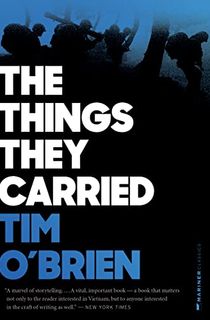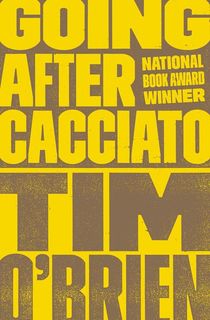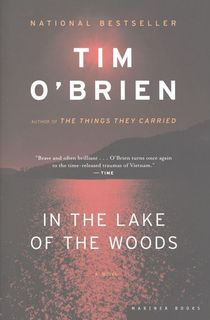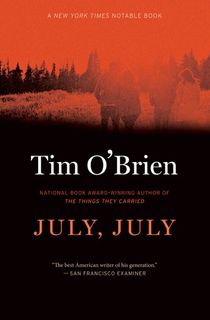Though today Tim O’Brien is probably best known as the author of the collection of linked, semi-autobiographical stories The Things They Carried, by the time he wrote that 1990 book, he had already won the National Book Award for his 1978 Vietnam War novel Going After Cacciato, in which a squad of soldiers go after an AWOL comrade-in-arms.
Many of O’Brien’s books are based on his experience in Vietnam, where he served a single tour of duty from 1969 until 1970. His experience “in country” informed much of his writing, and many of his books blur the lines of memoir and fiction. In one of the stories in The Things They Carried, he makes the distinction between “story-truth” and “happening-truth.” Story-truth, he argues, is emotional truth, and it is “sometimes truer than happening-truth,” or the facts of things that really occurred.

The Things They Carried
O’Brien’s best-known book was his third about the Vietnam War. Blurring the lines between autobiography and fiction, The Things They Carried draws heavily from O’Brien’s own experiences in country, including a semi-fictionalized version of himself as its main character.
Through a series of linked stories, the book tells the tale of the fictional “Alpha Company,” based heavily on people O’Brien met and experiences that he had during his time in Vietnam, while also exploring themes and questions that recur throughout his work. The New York Times called it “a classic of contemporary war fiction,” and it is regularly assigned in universities across the country.

If I Die in a Combat Zone: Box Me Up and Ship Me Home
Written shortly after O’Brien’s tour of duty, his first book about the Vietnam War is also perhaps the closest to pure memoir or autobiography, though it still takes fictional license with some of the names and descriptions of the people O’Brien encountered during his tour.
Moving through the entirety of his experience, from being drafted in his hometown, through basic training and into the field, until he was finally flown home after being transferred to the rear, the story is told outside of chronological order but narrates the daily life of a grunt fighting a war far from home. The result, according to the Washington Star, might just be “the single greatest piece of work to come out of Vietnam.”

Northern Lights
Following the glowing critical reception of If I Die in a Combat Zone, the expectations were high for O’Brien’s debut novel, which left the steaming jungles of Vietnam behind to tell a story about two brothers caught in a blizzard in northern Minnesota.
Of course, the shadow of the war isn’t gone entirely, as one of the brothers went to Vietnam, while the other did not. Though now considered perhaps O’Brien’s most flawed novel, this highly anticipated debut was called “a long, slow trek, but worth going the distance,” by Kirkus Reviews when it was first published in 1975.

Going After Cacciato
Winner of the National Book Award, O’Brien’s second novel was received with considerably more acclaim than his debut. This could partly be attributed to the fact that O’Brien had once more turned his attention to the war in Vietnam, in this surreal narrative of a soldier who goes AWOL—possibly all the way to Paris—and the squad that has to go after him.
Writing in The New York Times, Richard Freedman gave the book perhaps its most iconic review: “To call Going After Cacciato a novel about war is like calling Moby Dick a novel about whales.”

The Nuclear Age
O’Brien’s follow-up to Going After Cacciato once again deviates from the Vietnam War to look at a bigger anxiety—the fear of nuclear devastation. It focuses on a middle-aged man who is digging a bomb shelter in his backyard but, as he digs, the book spans across his memories and his life, and across a country that is traumatized by the fear of nuclear war.
It's a subject to which he turns the same mordant wit and incisive eye toward the truths of the human experience that led Time magazine to call O’Brien “Possibly the best writer about Vietnam.”

In the Lake of the Woods
Adapted into a made-for-TV movie in 1996, this 1994 novel is one of O’Brien’s most ambitious. Though it is set in Michigan well after the war, the events in Vietnam hang heavy over the narrative, especially the My Lai Massacre, a bloody event which O’Brien himself only narrowly missed participating in.
John Wade, the novel’s protagonist, is an aspiring politician who moves to a secluded part of the state after a failed senate campaign. He goes there with his wife, but one night, she simply disappears. The book compiles many hypotheses as to what might have happened to her, offering support and evidence for each, but ultimately no concrete resolution, an approach which O’Brien himself has called the truest way to tell a story.

Tomcat in Love
In perhaps O’Brien’s most unlikely novel, a womanizing linguistics professor bites off more than he can chew when his childhood sweetheart and longtime wife finally throws him over and he swears revenge.
Returning to his old hometown, he finds love in unexpected places, and embarks upon an unlikely career as a children’s TV personality in this humorous take on the battle between the sexes. It may not be the battlefield that O’Brien most often writes about, but he seems to be just as at home here.

July, July
“A symphony of American life.” That’s what NPR called this 2002 book about the 30-year class reunion of the 1969 class of Darton Hall College. As old friends gather, old wounds are reopened and old memories stirred in this “perceptive, affectionate, and often very funny” (Boston Herald) novel that is “almost impossible to put down” (Austin American-Statesman).
Rather than a single narrative, this New York Times Notable Book skips across the experiences of a dozen characters, jumping from past to present as they reminisce about the moments that shaped their lives, for better and worse.

America Fantastica
In his first new novel in more than two decades, O’Brien turns a mirror on a “post-Iraq war, mid-COVID, and mid-Trump world” that is “piercing and razor-sharp,” according to celebrated author Haruki Murakami, who calls O’Brien “the one American author whose works I look forward to the most.”
In a long-awaited return to form, a bank robbery in northern California kicks off “a satirical romp through a country plagued by deceit” (Kirkus) in a book that you’ll have to read to believe.
Featured photo: Micah Camper / Unsplash





